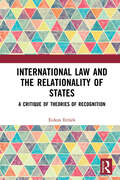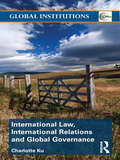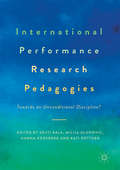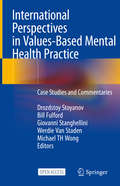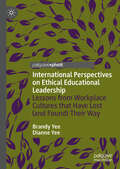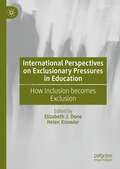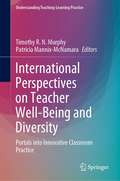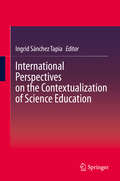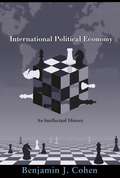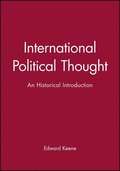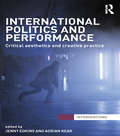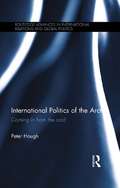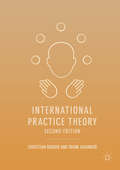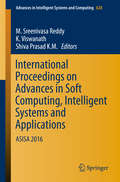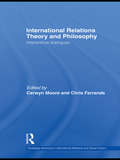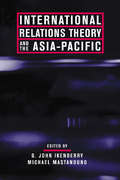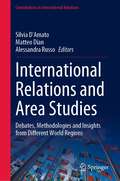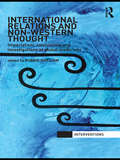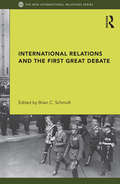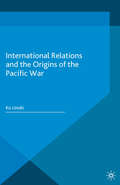- Table View
- List View
International Law and the Relationality of States: A Critique of Theories of Recognition
by Erdem ErtürkThis book critically engages with theories of the recognition of states under international law. Demonstrating that recognition is a constitutive relation that is imperative for the construction of international subjects, the book argues that prevalent theories of recognition fall short of accommodating this imperative. The book traces the source of this shortcoming to Vattel’s notion of absolute sovereignty. A paradox pertains to this notion as absolutely independent states seemingly come into being in a community which sets the law that determines statehood. The book shows how this paradox is reproduced in constitutive theorists’ idea of recognition as a sovereign gesture of consent and declarative theorists’ perception that states can come into being on a singular basis, without any need for interaction. This necessitates a rethinking of the role of recognition in a way that circumvents the problems generated by the notion of absolute independence, whilst accommodating the relational element of coming into being. To achieve this purpose, the book draws upon Hegel’s theory of recognition, supplementing it with Bataille’s and Derrida’s critical readings of Hegel’s thought. In this respect, the book departs from the restrictive economy of recognition that constantly recreates a paradoxical perception of sovereignty, elaborating a more general economy of recognition that accommodates the notion of subjects in flux. This critical engagement with a key notion in international law will appeal to legal and political theorists, as well as scholars and students in international relations.
International Law, International Relations and Global Governance: The International Law And International Relations Toolbox (Global Institutions)
by Charlotte KuInternational Relations and International Law have developed in parallel but distinctly throughout the 20th Century. However in recent years there has been recognition that their shared concerns in areas as diverse as the environment, transnational crime and terrorism, human rights and conflict resolution outweigh their disciplinary and methodological divergences. This concise and accessible volume focuses on collaborative work within the disciplines of international law and international relations, and highlights the need to develop this collaboration further, describing the value for individuals, states, IGOs, and other non-state actors in being able to draw on the cross-pollination of international relations and international legal scholarship. This book: examines how different elements of governance are interacting and shifting from one actor to another analyses the cumulative effect of these shifts, and evaluates how they both enhance and challenge the worlds governing capacity considers how the characteristics of an architecture for a globalized governance are emerging. Helping readers to examine and understand how accumulated actions over time have given rise to system-wide changes, this work is essential reading for all students of international law, international relations and global governance.
International Performance Research Pedagogies
by Milija Gluhovic Sruti Bala Hanna Korsberg Kati RöttgerThis book offers a unique and much-needed interrogation of the broader questions surrounding international performance research which are pertinent to the present and the future of Theatre and Performance studies. Marking the completion of eight years of the Erasmus Mundus MA Programme in International Performance Research (MAIPR) - a programme run jointly by the universities of Warwick (UK), Amsterdam (Netherlands), Helsinki/Tampere (Finland), Arts in Belgrade (Serbia), and Trinity College Dublin (Ireland) - the essays in this volume take stock of the achievements, insights and challenges of what international performance research is or ought to be about. By reflecting on the discipline of Performance Studies using the MAIPR programme as a case study in point, the volume addresses the broader question of the critical link between the discipline of Performance Studies and humanities education in general, examining their interactions in the contemporary university in the context of globalisation.
International Perspectives in Values-Based Mental Health Practice: Case Studies and Commentaries
by Giovanni Stanghellini Bill Fulford Drozdstoy Stoyanov Werdie Van Staden Michael Th WongThis open access book offers essential information on values-based practice (VBP): the clinical skills involved, teamwork and person-centered care, links between values and evidence, and the importance of partnerships in shared decision-making. Different cultures have different values; for example, partnership in decision-making looks very different, from the highly individualized perspective of European and North American cultures to the collective and family-oriented perspectives common in South East Asia. In turn, African cultures offer yet another perspective, one that falls between these two extremes (called batho pele).The book will benefit everyone concerned with the practical challenges of delivering mental health services. Accordingly, all contributions are developed on the basis of case vignettes, and cover a range of situations in which values underlie tensions or uncertainties regarding how to proceed in clinical practice. Examples include the patient’s autonomy and best interest, the physician’s commitment to establishing high standards of clinical governance, clinical versus community best interest, institutional versus clinical interests, patients insisting on medically unsound but legal treatments etc. Thus far, VBP publications have mainly dealt with clinical scenarios involving individual values (of clinicians and patients). Our objective with this book is to develop a model of VBP that is culturally much broader in scope. As such, it offers a vital resource for mental health stakeholders in an increasingly inter-connected world. It also offers opportunities for cross-learning in values-based practice between cultures with very different clinical care traditions.
International Perspectives on Ethical Educational Leadership: Lessons from Workplace Cultures That Have Lost (and Found) Their Way
by Brandy Yee Dianne YeeThis book considers ethical educational leadership dilemmas that impact the workplace cultures influencing school districts' success. As school systems become increasingly demographically, racially, and culturally diverse, the need intensifies for educational leaders to lead their school communities in an ethical manner, developing workplace cultures characterized by psychological and emotional safety. Based on research and extensive experience working with school districts in Canada, Germany, Finland, and the United States, Yee and Yee deliver vignettes from various school contexts illustrating ethical leadership dilemmas and leader responses indicative of both toxic and healthy workplace cultures. Finally, the authors present key lessons learned from healthy educational workplaces, illustrating next steps and a call to action for implementing and maintaining ethical school district leadership practices.
International Perspectives on Exclusionary Pressures in Education: How Inclusion becomes Exclusion
by Elizabeth J. Done Helen KnowlerThis book examines and problematises the concept of 'educational inclusion' within schools. Despite varying definitions of inclusion according to national context, there is a growing consensus that educational systems presented as ‘inclusive’ in policy and professional discourse, in practice, legitimise processes that appear far from inclusive. The editors and contributors draw together research from multiple contexts that considers systemic exclusionary pressures and practices from multiple perspectives, particularly less visible forms of social and educational exclusion. The book calls for true inclusion as an overriding socio-political and educational policy objective, and to end the marginalisation of specific groups beyond familiar neoliberal political discourses of piecemeal remediation.
International Perspectives on Financing Higher Education
by Wojciech Bienkowski Josef C. Brada Masaaki KuboniwaHigher education is increasingly important to the labor market success of individuals and the prosperity of nations, yet, as this book shows, public funding for higher education is declining. It presents innovative approaches to increasing funding for universities through closer ties with business and through privatization of universities.
International Perspectives on School-University Partnerships: Research, Policy and Practice
by Ondine Jayne Bradbury Daniela AcquaroThis book draws together international scholarship on school–university partnerships challenging thinking about purpose and sustainability as well as the power of collaboration in transcending organisational and contextual boundaries. Moving beyond transactional arrangements, the book showcase various models of school–university partnerships, and explores the role of policy, research, and practice, across the life cycle of partnerships. This edited collection presents a strong body of evidence with global significance, providing valuable insights into catalysts for partnerships, the drivers for transformational change, and generative growth resulting from authentic collaboration. An important reference for all teacher education providers, schools, and educational stakeholders, this book showcases global examples of the power of partnerships in an era necessitating cross sectoral collaboration to address contemporary societal challenges.
International Perspectives on Teacher Well-Being and Diversity: Portals into Innovative Classroom Practice (Understanding Teaching-Learning Practice)
by Timothy R. N. Murphy Patricia Mannix-McNamaraThis book explores teacher well-being in light of the increasingly ethnically diverse profiles of schools and classrooms, focusing on socially and linguistically diverse teaching contexts. It draws attention to the socio-economic disadvantages that can often be characteristic of ethnically diverse classrooms, prior to examining and reviewing the interconnections between teacher well-being and the implementation of pedagogical processes in the classroom teaching and learning context. Teachers and academics alike report on and address the well-being-related needs of practising teachers. This book contributes to the emerging field of literature on teacher well-being and offers international perspectives on lessons learnt in socially diverse and multilingual teaching contexts. Accordingly, it offers a valuable resource for teacher educators, researchers, pre-service and in-service teachers, and policymakers.
International Perspectives on the Contextualization of Science Education
by Ingrid Sánchez TapiaThis book explores how science learning can be more relevant and interesting for students and teachers by using a contextualized approach to science education. The contributors explore the contextualization of science education from multiple angles, such as teacher education, curriculum design, assessment and educational policy, and from multiple national perspectives. The aim of this exploration is to provide and inspire new practical approaches to bring science education closer to the lives of students to accelerate progress towards global scientific literacy. The book presents real life examples of how to make science relevant for children and adolescents of diverse ethnic and language backgrounds, socioeconomic status and nationalities, providing tools and guidance for teacher educators and researchers to improve the contextualization and cultural relevance of their practice. The book includes rigorous studies demonstrating that the contextualization of science learning environments is essential for student engagement in learning science and practitioners' reflections on how to apply this knowledge in the classroom and at national scale. This approach makes this book valuable for researchers and professors of science education and international education interested in designing teacher education courses that prepare future teachers to contextualize their teaching and in adding a critical dimension to their research agendas.
International Political Economy: An Intellectual History (The\library Of Essays In International Relations Ser.)
by Benjamin J. CohenThe field of international political economy gained prominence in the early 1970s--when the Arab oil embargo and other crises ended the postwar era of virtually unhindered economic growth in the United States and Europe--and today is an essential part of both political science and economics. This book offers the first comprehensive examination of this important field's development, the contrasting worldviews of its American and British schools, and the different ways scholars have sought to meet the challenges posed by an ever more complex and interdependent world economy. Benjamin Cohen explains the critical role played by the early "intellectual entrepreneurs," a generation of pioneering scholars determined to bridge the gap between international economics and international politics. Among them were brilliant thinkers like Robert Keohane, Susan Strange, and others whose legacies endure to the present day. Cohen shows how their personalities and the historical contexts in which they worked influenced how the field evolved. He examines the distinctly different insights of the American and British schools and addresses issues that have been central to the field's development, including systemic transformation, system governance, and the place of the sovereign state in formal analysis. The definitive intellectual history of international political economy, this book is the ideal volume for IPE scholars and those interested in learning more about the field.
International Political Theory after Hobbes
by Raia Prokhovnik Gabriella SlompThe idea of international political theory after Hobbes is a timely and lively focus through which to raise key questions about international politics, and to set up dialogues between historical political theory and contemporary theories of international relations about the legacy of Hobbes in international politics. The move by political theorists towards consideration of the international realm and the consequent blurring of the distinction between domestic and international politics over recent years has been marked. In the light of these changes, the role of Hobbes in the dominant realist theory of international relations requires urgent re-examination. This book makes an important and distinctive contribution to the argument that international political theory is moving beyond the reading of Hobbes as a founding theorist of the modern state in an inter-state system perpetuated by orthodox international relations. The volume brings together a set of internationally-respected researchers with an expertise on Hobbes' views on international relations in the context of the history of political thought, Hobbesian realism, and on Hobbes and contemporary international political theory.
International Political Thought: A Historical Introduction
by Edward KeeneThis volume offers an accessible and wide-ranging introduction to the history of international political thought. Taking as its starting-point the various concepts people have used to think about differences between political communities, the book explores changing perceptions of international politics from antiquity to the twentieth century. As well as discussing well-known themes such as relations between independent sovereign states and the tension between raison d'etat and a universal code of natural law, it also examines less familiar ideas which have influenced the development of international political thought such as the distinction between civilization, national culture and barbarism, religious attitudes towards infidels, and theories about racial difference and imperialism. Among the key thinkers covered are Thucydides, Machiavelli, Hobbes, Kant, Marx and Morgenthau, alongside less commonly studied figures such as Herodotus, Pope Innocent IV, Herder, Constant and Zimmern. Each chapter concludes with a guide to further reading which will help students to develop a more detailed understanding of the subject. Written with the beginner student in mind, this lively textbook is an ideal introduction for anyone studying international political thought.
International Politics and Performance: Critical Aesthetics and Creative Practice (Interventions)
by Jenny Edkins Adrian KearIn recent years we have witnessed an increasing convergence of work in International Politics and Performance Studies around the troubled, and often troubling, relationship between politics and aesthetics. Whilst examination of political aesthetics, aesthetic politics, and politics of aesthetic practice has been central to research in both disciplines for some time, the emergence of a distinctive ‘performative turn’ in International Politics and a critical return to the centrality of politics and the concept of ‘the political’ in Performance Studies highlights the importance of investigating the productivity of bringing the methods and approaches of the two fields of enquiry into dialogue and mutual relation. Exploring a wide range of issues including rioting, youth-driven protests, border security practices and the significance of cultural awareness in war, this text provides an accessible and cutting edge survey of the intersection of international politics and performance examining issues surrounding the politics of appearance, image, event and place; and discusses the development and deployment of innovative critical and creative research methods, from auto-ethnography to site-specific theatre-making, from philosophical aesthetics to the aesthetic thought of new securities scenario-planning. The book’s focus throughout is on the materiality of performance practices—on the politics of making, spectating, and participating in a variety of modes as political actors and audiences—whilst also seeking to explicate the performative dynamics of creative and critical thinking. Structured thematically and framed by a detailed introduction and conclusion, the focus is on producing a dialogue between contributors and providing an essential reference point in this developing field. This work is essential reading for students of politics and performance and will be of great interest to students and scholars of IR, performance studies and cultural studies.
International Politics of the Arctic: Coming in from the Cold (Routledge Advances in International Relations and Global Politics)
by Peter HoughThis book offers a wide-ranging account of the emerging issues of international politics in the Artic, and the emerging Geopolitical debates that surround the region. In this thorough but accessible book covering environmental issues, the author examines the Geopolitics of emerging land and resource disputes and the rise of both nationalist and pan-Arctic movements in the region. Whereas existing literature on the politics of the Arctic tends to focus either on the environment or on Geopolitical interests, this book considers both of these themes in addition to the politics of the region’s indigenous peoples and provides an overview on the emerging issues of international politics in the Arctic. The book makes full use of pedagogic features such as maps, diagrams, timelines, biographies and boxes highlighting key concepts and issues in order to make this an accessible book for both students and scholars alike. This book will be of interest to students and scholars of International Relations, Arctic Politics, Environmental Politics and European Politics.
International Practice Theory: Core Approaches
by Frank Gadinger Christian BuegerInternational Practice Theory is the definitive introduction to the practice turn in world politics, providing an accessible, up-to-date guide to the approaches, concepts, methodologies and methods of the subject. Situating the study of practices in contemporary theory and reviewing approaches ranging from Bourdieu’s praxeology and communities of practice to actor-network theory and pragmatic sociology, it documents how they can be used to study international practices empirically. The book features a discussion of how scholars can navigate ontological challenges such as order and change, micro and macro, bodies and objects, and power and critique. Interpreting practice theory as a methodological orientation, it also provides an essential guide for the design, execution and drafting of a praxiographic study.
International Proceedings on Advances in Soft Computing, Intelligent Systems and Applications
by K. Viswanath M. Sreenivasa Reddy Shiva Prasad K.M.The book focuses on the state-of-the-art technologies pertaining to advances in soft computing, intelligent system and applications. The Proceedings of ASISA 2016 presents novel and original work in soft computing, intelligent system and applications by the experts and budding researchers. These are the cutting edge technologies that have immense application in various fields. The papers discuss many real world complex problems that cannot be easily handled with traditional mathematical methods. The exact solution of the problems at hand can be achieved with soft computing techniques. Soft computing represents a collection of computational techniques inheriting inspiration from evolutionary algorithms, nature inspired algorithms, bio-inspired algorithms, neural networks and fuzzy logic.
International Public Health Policy and Ethics (The International Library of Bioethics #106)
by Michael BoylanThis second edition of International Public Health Policy and Ethics complements the popular first edition with contemporary problems in international public health. It brings together philosophers and practitioners to address the foundations and principles upon which public health policy may be advanced – especially in the international arena. What is the basis that justifies public health in the first place? Why should individuals be disadvantaged for the sake of the group? How do policy concerns and clinical practice work together and work against each other? Can the boundaries of public health be extended to include social ills that are amenable to group-dynamic solutions? What about political issues? How can international finance make an impact? These are some of the crucial questions that form the core of this volume of original essays sure to cause practitioners to engage in a critical re-evaluation of the role of ethics in public health policy. With a targeted new essay dealing with COVID and public health issues in Africa this second edition provides a resource building on the first edition.
International Relations Theory and Philosophy: Interpretive dialogues (Routledge Advances in International Relations and Global Politics)
by Cerwyn MooreThis book discusses the contribution of philosophers and thinkers whose ideas have recently begun to permeate international relations theory. It provides an introduction to the contemporary debates regarding theories and methodologies used to study international relations, particularly the relationships between interpretive accounts of social action, European philosophical traditions, hermeneutics and the discipline of international relations. The authors provides a platform for dialogue between theorists and researchers engaged in a more specific area studies, geo-political studies, political theory and historical accounts of international politics. The volume analyzes a variety of theoretical and explores the work of Nietzsche, Heidegger, Gramsci, Wittgenstein, Gadamer, Levinas, Bakhtin, Patocka, Derridean, Deleuze and Susan Sontag. Making an important contribution to discussions about how to study the complexities of world politics, this book will be of interest to students and researchers of international relations, politics, sociology, philosophy and political theory.
International Relations Theory and the Asia-Pacific
by Michael Mastanduno G. John. Ikenberry Eds.What will the Asia-Pacific rim look like in the years ahead? What tools will international relations theorists need to understand the complex relationship among China, Japan, and the United States as the three powers shape the economic and political future of this crucial region?Some of the best and most innovative scholars in international relations and Asian area studies gather here with the working premise that stability in the broader Asia-Pacific region is in large part a function of the behavior of, and relationships among, these three major powers. Each author analyzes the foreign policy behavior of one or more of these states and/or relations among them in an effort to make claims about the prospects for regional stability. Some of the chapters focus on security relationships, some on economic relations, and some on the interaction of the two. The authors do not promote any particular theoretical perspective, but instead draw on the full diversity of theoretical approaches in contemporary international relations scholarship to illuminate international interactions among the Pacific powers.The creative collaboration of international relations and Asian studies specialists presents the opportunity to assess the applicability of Western categories of analysis to the beliefs and behaviors of Asian actors. The scholars in this volume share the conviction that a deeper understanding of the effects of cultural divides between Asian and American policymakers is essential if the Pacific rim's economic and regional security is to be safeguarded.
International Relations Theory and the Asia-Pacific
by Michael Mastanduno G. John. IkenberryWhat tools will international relations theorists need to understand the complex relationship among China, Japan, and the United States as the three powers shape the economic and political future of this crucial region? Some of the best and most innovative scholars in international relations and Asian area studies gather here with the working premise that stability in the broader Asia-Pacific region is in large part a function of the behavior of, and relationships among, these three major powers.
International Relations and Area Studies: Debates, Methodologies and Insights from Different World Regions (Contributions to International Relations)
by Matteo Dian Alessandra Russo Silvia D'AmatoDiscover the intricate tapestry of international politics and governance with this book. The book delves into the diverse nature of globally significant actors and systems across multiple regions. From Africa to Asia, Europe to the Middle East, this collection of thought-provoking case studies explores the role of regional actors in the international system. Combining theoretical innovation with empirical analysis, this volume expands the boundaries of International Relations (IR) and Area Studies (AS), showcasing their interconnections throughout history and in contemporary contexts. Through illuminating case studies drawn from the fields of "Comparative Regionalism" and "Non-Western IR Theory," the book sheds light on pressing international events. Unpacking complex questions, the contributors examine the application of IR scholarship to global events and provide fresh insights into political dynamics, conflicts, and state instability across various regions. By offering a comparative perspective on threats, political contestation, and security policies, this book challenges existing perspectives and enriches the debate. With its methodological and epistemological explorations, this book is an indispensable resource for scholars and students of international relations and security studies, as well as researchers focusing on specific world areas. Embark on a captivating journey through the multifaceted landscape of global affairs.
International Relations and Non-Western Thought: Imperialism, Colonialism and Investigations of Global Modernity (Interventions)
by Robbie ShilliamInternational Relations, as a discipline, tends to focus upon European and Western canons of modern social and political thought. Alternatively, this book explores the global imperial and colonial context within which knowledge of modernity has been developed. The chapters sketch out the historical depth and contemporary significance of non-Western thought on modernity, as well as the rich diversity of its individuals, groups, movements and traditions. The contributors theoretically and substantively engage with non-Western thought in ways that refuse to render it exotic to, superfluous to or derivative of the orthodox Western canon of social and political thought. Taken as a whole, the book provides deep insights into the contested nature of a global modernity shaped so fundamentally by Western colonialism and imperialism. Now, as ever, these insights are desperately needed for a discipline that is so closely implicated in Western foreign policy making and yet retains such a myopic horizon of inquiry. This work provides a significant contribution to the field and will be of great interest to all scholars of politics, political theory and international relations theory.
International Relations and the First Great Debate (New International Relations)
by Brian C. SchmidtThis book provides an authoritative account of the controversy about the first great debate in the field of International Relations. Of all the self-images of International Relations, none is as pervasive and enduring as the notion that a great debate pitting idealists against realists took place in the 1940s. The story of the first great debate continues to structure the contemporary identity of International Relations, yet in recent years revisionist historians have challenged the conventional wisdom that the field experienced such a debate. Drawing on expert contributors working in Canada, Europe, the United Kingdom, and the United States, this book includes key participants in the historiographical controversy. The book assembles the existing scholarship and provides a thorough analysis of the status of the first great debate in the history of International Relations. It is an invaluable examination of the causes and future direction of idealist and realist arguments. International Relations and the First Great Debate will be of interest to students and scholars concerned with the foundations of International Relations.
International Relations and the Origins of the Pacific War
by Ko UnokiInternational Relations and the Origins of the Pacific War takes the unique approach of examining the history of the relationship between Japan and the United States by using the framework of international relations theories to search for the origins of the Pacific War, that erupted with Japan's attack on Pearl Harbour in 1941.
